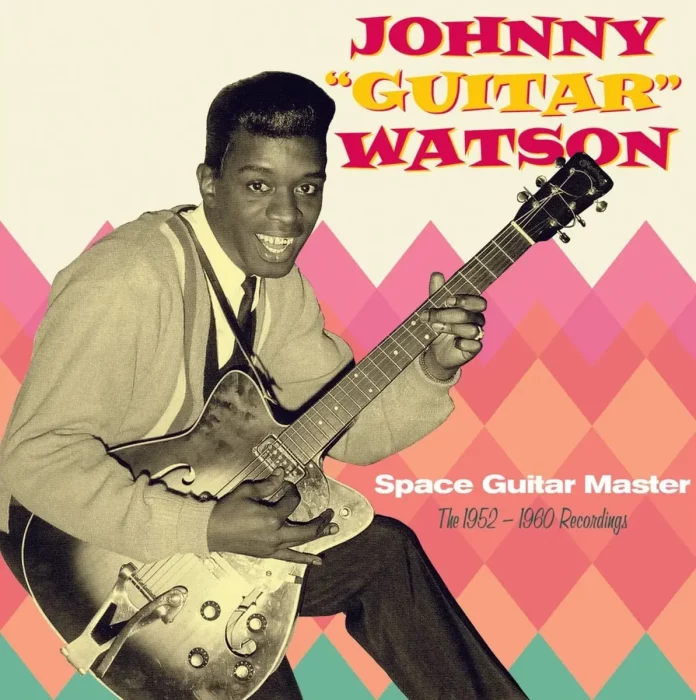Despite a lack of any major hits, Johnny “Guitar” Watson has long been recognised as one of the geniuses of blues and R&B. Besides being a pioneer, he was a multi-talented artist. Despite being a saxophonist and a mean boogie-woogie pianist, he will be best remembered as an innovative guitarist, one of the first to use reverb and feedback as part of his performance. This was said to have influenced the likes of Bo Diddley, Ike Turner, Jimi Hendrix and Stevie Ray Vaughan. Frank Zappa is said to have taken up playing the guitar after listening to Watson and Etta James has made no secret that her way of singing ballads can be traced to Watson’s own style. Beyond playing, Watson was also a prolific songwriter and soulful singer. This CD puts together the best blues sides he made for labels such as Federal, Modern, Keen, RPM, Class and Arvee between 1952 and 1960.
Born in Houston in 1935, Watson moved to Los Angeles in 1950 with his father. He was a regular in talent competitions, which led to him working as a pianist in various West Coast blues and jazz bands. He made his first record in 1953 as Young John Watson, and his style helped define a new West Coast jump-blues style. Watson recorded the song Gangster Of Love (successfully covered by Steve Miller in 1968) for the Keen label in 1957, although the re-cut for King records in 1963 was more successful. In 1964, Watson cut a jazz album for Chess (The Blues Soul Of Johnny (Guitar) Watson). He had a successful tour of the UK in 1965 before returning to the US and having a minor hit in 1967 with Mercy, Mercy, Mercy, predating The Buckinghams’ release by a few months.
Watson’s distinctive guitar sound emerged back in the 50s when Fender had started to put reverb on their amplifiers. Whilst most guitarists were cautious of using it, Watson jumped in and began experimentation with both reverb and feedback effects. It brought Watson his first instrumental hit called Space Jam. At the session, a perplexed sound engineer asked Watson what he was trying to do and asked him whether he was some kind of spaceman.
At the end of the 60s, Watson disappeared from public view but returned, revitalised, in the mid-70s as a funk artist and scored another hit with I Don’t Want To Be A Lone Ranger. Several more releases and a couple of albums (A Real Mother For Ya and Strike On Computers) for DJM Records did well, before he, once again, fell out of the spotlight. But writing Watson off prematurely was always a mistake and he returned in 1994 with a Grammy-nominated album for Bellmark called Bow Wow. During the comeback tour Watson died on stage in May 1996 at the age of 61. Watson once said that if he were to die, he wanted to do it on stage. He got his way as he so often did.
Watson was a showman and a gifted, but sadly under-appreciated guitarist and musician. Hopefully, this splendid release of early recordings by Hoodoo will shine the spotlight once more on this great West Coast bluesman.
Discography
Deana Baby; Ruben; Gangster Of Love; Untouchable; I Got Eyes; Space Guitar; Love Me Baby; Hot Little Mama; Too Tired; I Love To Love You; Johnny Guitar; Honey; Ain’t Gonna Hush; Looking Back; One More Kiss; Just Won’t Treat Me Rite; Motor Head Baby; Oh Baby; Someone Cares For Me; Thinking; Those Lonely, Lonely Nights; No I Can’t; Gettin’ Drunk; She Moves Me; Lonely Girl; Give A Little; Half Pint Of Whiskey; What’s Going On (73.55)
Watson (v, g); Maxwell Davis, Milt Bradford, Chuck Higgins, Bill Gather (ts); Clyde Dunn, Jim Wynn (bar); Rene Hall, Wayne Bennett, Harold Grant (g); Mario Delagarde (b), Willard McDaniel (p); Charles Pendergraph, Robert “Snake” Sims (d); Cordello de Milo (v) among others. Los Angeles, 1952-1960.
Hoodoo Essentials 3031
















